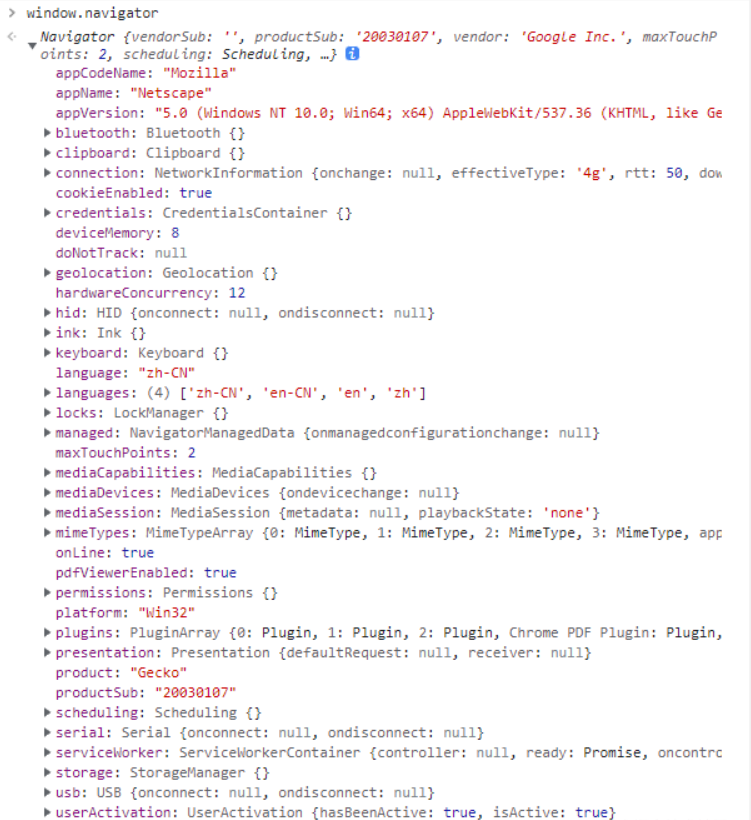JavaScript 获取用户操作系统信息及浏览器信息
大约 3 分钟
JavaScript 获取用户操作系统信息及浏览器信息
部分项目场景中可能需要检测用户当前的浏览器环境,比如当前操作系统是window还是iOS,检测用户是通过什么浏览器访问的(Chrome、IE 等)。网上很多类似的代码,但是随着标准和浏览器更迭有所变动,特此汇总。
window.navigator 属性
只读属性 Window.navigator 会返回一个 Navigator 对象的引用,可以用于请求运行当前代码的应用程序的相关信息。
const navigatorObject = window.navigator

其中常用的属性有:
| 属性名 | 作用 |
|---|---|
| appCodeName | 返回浏览器的代码名 |
| appMinorVersion | 返回浏览器的次级版本 |
| appName | 返回浏览器的名称 |
| appVersion | 返回浏览器的平台和版本信息 |
| browserLanguage | 返回当前浏览器的语言 |
| cookieEnabled | 返回指明浏览器中是否启用 cookie 的布尔值 |
| cpuClass | 返回浏览器系统的 CPU 等级 |
| onLine | 返回指明系统是否处于脱机模式的布尔值。 |
| platform | 返回运行浏览器的操作系统平台 |
| systemLanguage | 返回 OS 使用的默认语言 |
| userAgent | 返回由客户机发送服务器的 user-agent 头部的值 |
| userLanguage | 返回 OS 的自然语言设置 |
获取客户端操作系统信息
简单法:
console.log(window.navigator.platform);
自定方法:
export function getUserOsInfo() {
const userAgent = navigator.userAgent;
if (userAgent.indexOf("Windows NT 10.0") !== -1) return "Windows 10";
if (userAgent.indexOf("Windows NT 6.2") !== -1) return "Windows 8";
if (userAgent.indexOf("Windows NT 6.1") !== -1) return "Windows 7";
if (userAgent.indexOf("Windows NT 6.0") !== -1) return "Windows Vista";
if (userAgent.indexOf("Windows NT 5.1") !== -1) return "Windows XP";
if (userAgent.indexOf("Windows NT 5.0") !== -1) return "Windows 2000";
if (userAgent.indexOf("Mac") !== -1) return "Mac/iOS";
if (userAgent.indexOf("X11") !== -1) return "UNIX";
if (userAgent.indexOf("Linux") !== -1) return "Linux";
return "Other";
}
navigator.userAgent只读属性实际返回关于你运行信息的字符串
'Mozilla/5.0 (Windows NT 10.0; Win64; x64) AppleWebKit/537.36 (KHTML, like Gecko) Chrome/108.0.0.0 Safari/537.36'
获取用户浏览器信息
// 获取浏览器类型
export function getBrowserType () {
let ua = navigator.userAgent.toLocaleLowerCase()
let browserType = null
if (ua.match(/msie/) != null || ua.match(/trident/) != null) {
browserType = 'IE'
} else if (ua.match(/firefox/) != null) {
browserType = 'firefox'
} else if (ua.match(/ucbrowser/) != null) {
browserType = 'UC'
} else if (ua.match(/opera/) != null || ua.match(/opr/) != null) {
browserType = 'opera'
} else if (ua.match(/bidubrowser/) != null) {
browserType = 'baidu'
} else if (ua.match(/metasr/) != null) {
browserType = 'sougou'
} else if (ua.match(/tencenttraveler/) != null || ua.match(/qqbrowse/) != null) {
browserType = 'QQ'
} else if (ua.match(/maxthon/) != null) {
browserType = 'maxthon'
} else if (ua.match(/chrome/) != null) {
var is360 = _mime('type', 'application/vnd.chromium.remoting-viewer')
if (is360) {
browserType = '360'
} else {
browserType = 'chrome'
}
} else if (ua.match(/safari/) != null) {
browserType = 'Safari'
} else {
browserType = 'others'
}
return browserType
}
风险
以上场景主要使用navigator.userAgent进行识别,但基于检测用户代理字符串agent string的浏览器识别是比较不可靠的,因为用户代理字符串是用户可配置的。例如:
- 在 Firefox 中,你可以在
about:config中更改首选项general.useragent.override。一些火狐扩展是这样做的。但是,这只会更改发送并由navigator.userAgent返回的HTTP标头。可能还有其他方法利用 JavaScript 代码来识别浏览器。 - Opera 6+ 允许用户通过菜单设置浏览器标识字符串。
- Microsoft Internet Explorer使用Windows注册表。
- Safari 和 iCab 允许用户通过菜单将浏览器用户代理字符串更改为预定义的 Internet Explorer 或 Netscape 字符串。
